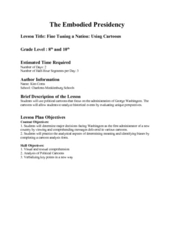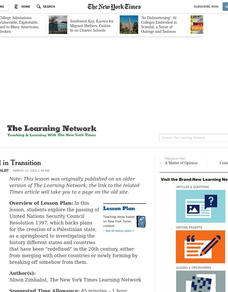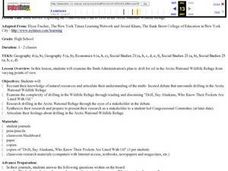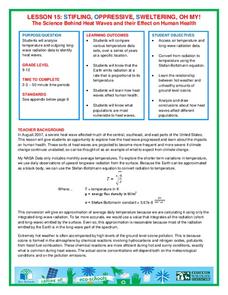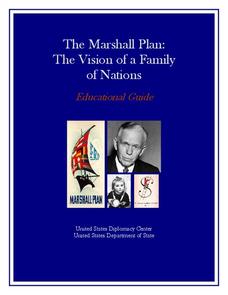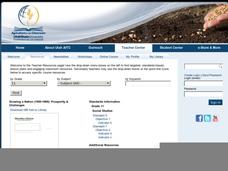Curated OER
Keeping The Peace: The Role Of The United Nations Peacekeeping Force
Students explore the role of the United Nations Peacekeeping Force. Students discuss the creation and purpose of the United Nations Peacekeeping Forces. They research where troops have served. In groups, students explore one current...
Curated OER
International Curiosity and National Pride
Students analyze their own culture and a Bulgarian culture to identify national, local, or ethnic traits. In this culture analysis lesson plan, students identify three important characteristics of their culture and compose a list of...
Curated OER
Fine Tuning a Nation: Using Cartoons
Students examine political cartoons to gain an understanding of the political issues that George Washington faced. In this historical perspectives lesson, students analyze political cartoons about the National Bank, the title presidents,...
Curated OER
A World in Transition
Students explore the passing of United Nations Security Council Resolution 1397, which backs plans for the creation of a Palestinian state, as a springboard to investigating the history different countries that have been redefined in the...
Curated OER
What They Left Behind: Early Multi-National Influences in the United States
Students examine how the European voyages of discovery influence American culture even today. They map eighteenth century Europe's impact on the United States.
Equality and Human Rights Commission
How Do Human Rights Work?
Do human rights apply to children? Scholars learn of three children asking for help to determine their rights and how to handle specific situations. Class members must research any laws pertaining to the requested right and how the...
Curated OER
Exploring the Controversial Plan to Drill in the Arctic National Wildlife Refuge
Young scholars examine the Bush Administration's plan to drill for oil in the Arctic National Wildlife Refuge from varying points of view. They work in small groups in order to perform their research, but they compose individual journal...
Curated OER
Great Depression and New Deal
The five activities outlined in this resource packet engage class members in projects that ask them to research the causes and the effects, both national and local, of the Great Depression and the New Deal policies of FDR.
National Wildlife Federation
Stifling, Oppressive, Sweltering, Oh My!
Looking for a hot date? Pick any day in August, statistically the hottest month in the United States. The 15th lesson in the series of 21 instructs pupils to investigate the August 2007 heat wave through NASA data, daily temperature...
PBS
Universal Declaration of Human Rights
What rights are guaranteed to students? Do they align with the Universal Declaration of Human Rights, which was approved by the United Nations in 1948? Middle and high schoolers present persuasive arguments about the rights they believe...
Facing History and Ourselves
Civil Rights Historical Investigations
The murder of Emmett Till, the Selma to Montgomery march, and the desegregation of Boston schools are the focus of three units that ask class members to investigate why these events were so key in the struggle for civil rights. Groups...
US Department of State
The Marshall Plan: The Vision of a Family of Nations
The European Recovery Act (aka the Marshall Plan) was designed to bring together and develop a spirit of cooperation among European nations after World War II. Class members examine the materials from the Marshall Plan exhibit and assess...
Curated OER
What They Left Behind: Early Multi-National Influences in the United States
Students research the impact of European voyages of discovery and colonial influence on different aspects of American culture. They access a number of online sources and reference maps to trace the influences of England, France, Holland,...
Baylor College
HIV/AIDS in the United States
In the final of five lessons about HIV/AIDS, groups create presentations to share data about the infection rates in the United States, examining demographic and geographic trends over the past ten years. Depending on how much time you...
Alabama Department of Archives and History
Clotilde, The Last Slave Ship
The Clotilde was the last known ship to bring slaves from Africa to the United States - good riddance! Dive into the details of the ship, its cargo, origin, and route, and learn about the future of the Africans on board with a...
Curated OER
The Supreme Court: The Judicial Power of the United States
Students investigate some basic facts about the Supreme Court by examining the United States Constitution and one of the landmark cases decided by that court. The operation of the Supreme Court forms the focus of the lesson.
Agriculture in the Classroom
Growing a Nation (1930-1949): From Defeat to Victory, Lesson 2
Using primary source materials including radio broadcasts, films, and interview transcripts, history students gain a better understanding of the Dust Bowl, relief efforts for farmers, and the nation's agricultural past. It includes...
Humanities Texas
Primary Source Worksheet: Excerpt from Reagan's Speech to the National Association of Evangelicals
Ronald Reagan's 1983 speech to the National Association of Evangelicals (also know as the "Evil Empire Speech") offers readers with an opportunity to practice their skills at reading informational text, specifically primary source...
Agriculture in the Classroom
Growing a Nation (1950-1969): Prosperity & Challenges: The Story of American Agriculture
A wonderful lesson plan on the development and impact of mechanized farming! History or agriculture classes learn the historical background of the United States' food production by creating a pamphlet with information on the cause and...
Library of Congress
Thomas Jefferson's Library: Making the Case for a National Library
The United States Library of Congress, the largest library in the world. But such was not always the case. The library was destroyed during the War of 1812. In a persuasive letter to Samuel H. Smith, Thomas Jefferson offered to sell his...
Community Colleges of Los Angeles
Seeking Refuge: Understanding Refugees in Canada
What if you had no choice but to leave everything behind and seek asylum elsewhere? Do countries have an obligation to accept refugees? To gain an understanding of the complexity of the issues of refugee rights, class members first...
Curated OER
Classroom Unity Representing a Nation of Immigrants
Investigate national unity in a month-long lesson. After creating "I am from" poems, 5th graders will construct accordion flip books, listing and illustrating reasons for settlement. Choosing illustrations, essays, or Powerpoint...
Curated OER
The People and Philosophy Behind Our National Parks: A Biographical Curriculum Unit
Young scholars discover the interaction of American Literature, politics and the environmental movement. They explore the changing concept and philosophy of wilderness, and explain the development of The National Park System. They read...
Curated OER
Is A Nation Always A Region?
Students define the term, "nation," and analyze the boundaries established in Africa by colonial powers. In small groups, they participate in a simulated United Nations, develop a list of questions, analyze the nations of Africa, and...
Other popular searches
- Model United Nations
- The United Nations
- Israel and United Nations
- United Nations Test
- United Nations in Iraq
- United Nations Criticism
- United Nations Role
- United Nations Resolutions
- Nato, United Nations
- United Nations Assembly
- Nato United Nations
- The United Nations Lessons




